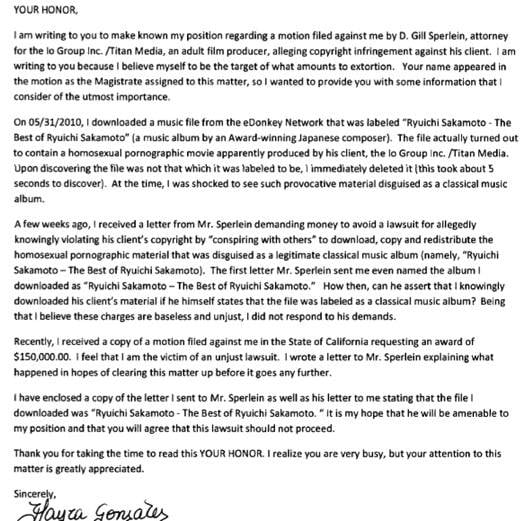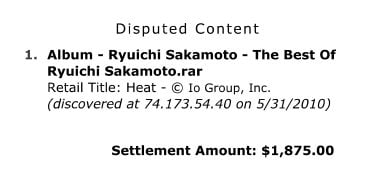Since 2010 more than 175,000 people have been sued for online copyright related offenses in the U.S. All of these defendants are accused of sharing films on P2P networks without the consent of copyright holders.
Unlike other lawsuits, the aim of the copyright holders is not to take any of the defendants to court, but to get alleged infringers to pay a substantial cash settlement to make legal action go away.
Recognizing the potential profitability of such schemes – which some equal to extortion – copyright holders of more obscure content quickly embraced them. Often described as copyright trolls, these companies can make more money from speculative lawsuits than actually selling the films they produced.
But while objectionable in their current form, it appears that these enterprises have the potential to stoop to even greater lows. A new scheme we uncover today allows anyone to setup a honeypot and make hundreds of thousands of dollars from naive file-sharers.
A lawsuit that appeared on TorrentFreak’s radar recently shows that in some cases copyright holders are suing people who were not aware that they have even accessed the content they are accused of sharing. The copyright holder in question makes no secret of this practice, which has already claimed several victims across the U.S.
Before we lay out the details we have to say that there’s no indisputable proof of a honeypot in this particular case. But as will become clear, the foundations for such a scheme are definitely there.
The case in question is “IO Group, Inc., v. Does 1-50 Inclusive,” which is a suit from the Californian adult entertainment company Titan Media against 50 unnamed individuals (complaint). The defendants in this case are accused of civil conspiracy and infringing the copyrights of various adult films on the eDonkey (eD2K) P2P network.
By itself the above is nothing special, but there’s one detail that’s somewhat fishy to say the least. In the court papers there’s a letter from a Ms. Gonzales that reveals some very interesting details. In her plea for mercy, Ms. Gonzales explains to the court that she never intended to download gay porn, and that the file she downloaded was labeled as a greatest hits album from the Japanese composer Ryuichi Sakamoto.
The Letter

What’s even more interesting is that Titan Media’s lawyer was fully aware of the fact that Ms. Gonzales downloaded a mislabeled file. In fact, the settlement letter she received gave her the option to settle the case for $1,875, and clearly stated that the title of the infringed work was “Album – Ryuichi Sakamoto – The Best Of Ryuichi Sakamoto.rar.” If Ms. Gonzales did not pay within a few weeks, the settlement offer would increase to $3,375, it further noted.

To our best knowledge, this is the first time that a copyright holder has gone after people who’ve downloaded mislabeled copies of their work. However, it turns out that this is not an isolated incident. TorrentFreak found another example where Titan Media sued someone for sharing a supposed Dire Straits concert that actually turned out to be an adult movie. Again, they were fully aware of the mislabeled file, and even explained the process to the court in their complaint (page 7).
The big question is of course, how did the plaintiffs know that the mislabeled files were actually disguised versions of their works? The logical explanation would be that they found the original copyrighted work, and discovered the relabeled files when they did a search for the hash. However, TorrentFreak found that in the case of the supposed Ryuichi Sakamoto file, all alternative copies of the allegedly infringed movie we could find had a different hash..
The above suggests that the copyright holders in question may have intentionally renamed the files as bait for naive pirates. A classic honeypot. However, Titan Media’s lawyer Gill Sperlein told TorrentFreak that this is absolutely not the case.
“This is not a scheme to make money. My clients are hurt immensely by copyright infringement and they are not going to make it worse by actually distributing their works on these networks,” he told us.
Sperlein further told TorrentFreak that they assume that people who downloaded a mislabeled file were actually aware of the real contents. And if this is not the case, it’s their responsibility to convince the court otherwise.
“If someone made my clients’ works available but did so unintentionally it is up to them to set forth facts that prove that claim. This would not affect liability but may affect damages,” Sperlein told TorrentFreak.
“However, I don’t think that someone searching for stolen content but simply got the wrong stolen content is going to prove they are an innocent infringer – no matter how loudly they protest that they are Christian,” Sperlein added, referring to Ms. Gonzales’ plea for mercy.
So there we have it. All the ingredients of a classic honeypot. However, without solid evidence it’s impossible for us to prove, as it will be for the court. For now, this is the sad conclusion that may lead to even greater abuse of the U.S. courts. After all, the above shows how easy it is to make tens of thousands of dollars, even with movies or indeed any material that no living soul is interested in.
All one has to do is shoot a 5 minute video with a mobile phone, copyright it, then sit back and wait for someone to magically appear and rename your video to match the title of the latest Hollywood blockbuster or a musical artist. He or she will then upload it to a file-sharing network, resulting in thousands of downloads, and for each of these you can demand several thousands of dollars in damages. It’s really that simple.
The court will never know that you’re suing for relabeled files, that will remain between you and the thousands of infringers. It’s the perfect pirate honeypot scheme that only requires a judge to sign off on the subpoenas.
Let’s hope that judges in future cases, especially those dealing with eDonkey downloads, will be aware of this suspicious and trollish process. Aside from the Titan Media cases, there are several others that show signs of a honeypot, and more will follow. It seems to us that no sane judge can agree that these low tactics are what copyright litigation was originally intended for.





